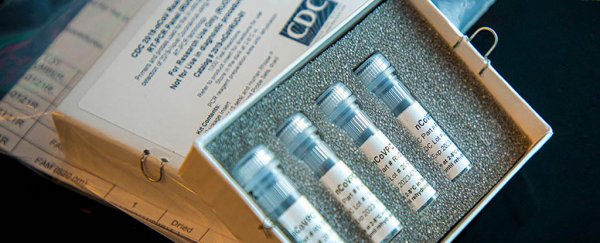Getting tested for coronavirus depends on a range of factors, such as where you live and where you've been recently.
Maybe it's been a day or two since that overseas trip. You're feeling lethargic and under the weather. A quick temperature check reveals a slight fever, and you've noticed a tickle that's rapidly becoming a cough. What do you do?
With cases of the disease COVID-19 on the rise around the world, it's hard not to worry that you've just become another statistic. A quick trip to the doctor is in order, right?
First, you should do a bit of research.
Where do you go to get tested for coronavirus?
Finding somebody who can test for the pathogen, called 'severe acute respiratory syndrome coronavirus 2' (or SARS CoV-2 for short), will depend on where you live.
Some areas, such as the UK, will only test if there's a strong chance you've become infected. In other countries doctors can request testing kits and determine for themselves whether they will see you or not.
Testing policies and procedures are also changing as the virus spreads. So it's important to inform yourself before heading out in search of medical assistance.
Look up your country's national health service, or call your local medical centre or hospital and clearly communicate your symptoms and travel history. In the UK, you can call a national hotline on 111.
How will they test you?
Different countries and states have developed their own testing procedures and materials, which will expand and evolve over time as new information comes to light.
Usually, medical staff will either require a sample of saliva or sputum (including mucus from the nasal or throat areas), or a swab of the nose and throat. In some cases, a blood sample might be requested, either instead of or in addition to the swab.
With its genome sequenced as of late January 2020, pathologists can now identify regions that are specific to the virus and create complementary probes to highlight them. A process called a polymerase chain reaction (PCR) can use those probes to amplify any signature sequences that might be present to a point where they can be identified
In the case of SARS-CoV2 for example, the CDC's real time PCR test is based on the presence of three sequences. One is a code common to SARS-like coronaviruses, but the other two are specific to SARS-CoV2. The presence of just two sequences is interpreted as an inconclusive result; all three are needed to register a positive test.
Another method, called a serology test, identifies the presence of antibodies in the patient's blood - antibodies which were created to latch onto signature markers on the outside of the virus.
While serology tests can miss cases where antibodies are yet to be produced in significant quantities, they make up for it by being able to identify past infections. Singapore has used serology testing to track the spread of SARS-CoV2 between different clusters, for example.
What if you get a positive result?
Unfortunately, there is no treatment specific to the management of COVID-19.
Statistically speaking, COVID-19 is typically a mild illness. If you're relatively young with few serious health problems, your prognosis is likely to be little worse than a bad cold or flu. Rest, isolate, and practice good hygiene.
If you're worried, contact your local hospital or emergency centre.
Higher level concerns around the coronavirus outbreak mostly involve risks to more vulnerable members of the global community, and pressure on healthcare systems and other infrastructure as authorities do their best to contain and manage its spread. That's why it's so important to limit the number of infections.
All articles are determined by fact checkers to be correct and relevant at the time of publishing. Information published on the coronavirus during the 2020 COVID-19 pandemic may be updated frequently to reflect the dynamic nature of current understanding.
